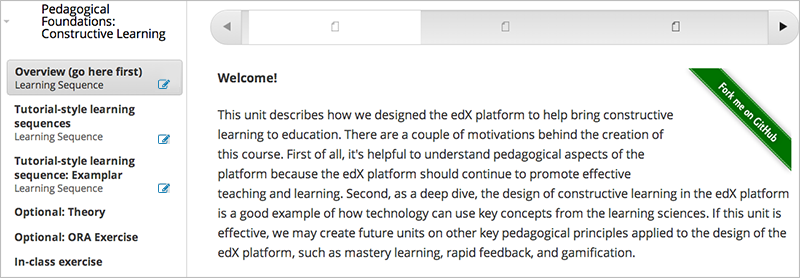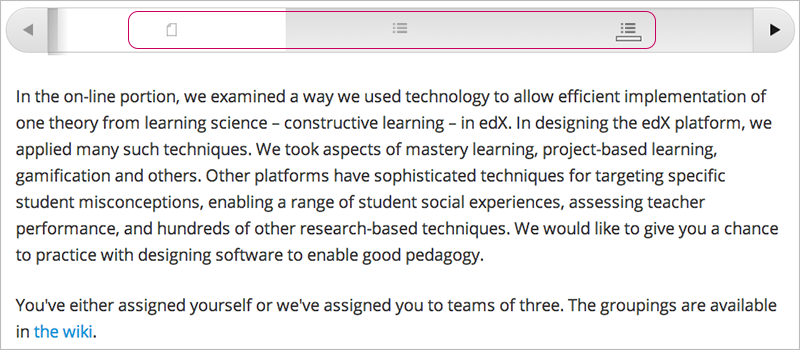The course.xml file (advanced usage)#
Warning
This page was written in 2013 and may no longer work for imports into Open edX Studio. Alternative ways of structuring OLX aside from the Studio export format described elsewhere in this OLX guide are not guaranteed by the Open edX project to work with Open edX Studio in the future.
Additionally, however a course is written, if that course is imported into Studio, Studio will export it in the specifically structured form of OLX containers described elsewhere in this guide.
Example Course Hierarchy#
Open edX courseware is organized into chapters, sequentials, and verticals.
For example, the following XML defines the first chapter, sequential, and
vertical directly in the course.xml file.
<chapter display_name="Pedagogical Foundations: Constructive Learning"
url_name="Week_2_Technology_enabled_constructive_learning">
<sequential format="Learning Sequence" graded="true"
display_name="Overview (go here first)"
url_name="Overview_go_here_first">
<vertical display_name="Week's overview" url_name="Week_s_overview">
<html display_name="Week overview" filename="Week_overview"
url_name="Week_overview"/>
<done display_name="Read week overview"
url_name="Read_week_overview" align="right"/>
The vertical Week's Overview contains an HTML component that references the
file Week_overview in the HTML directory.
Learners see this content in the Learning Management System as follows.

Sequentials that Contain XBlocks#
One advantage of OLX (open learning XML) is the flexibility it allows in how a course is organized. For example, authors can nest XBlocks and problems directly in a sequential, without the need for a vertical. This streamlines the course creation process while maintaining consistency in how students interact with courseware.
Warning
This structure is not guaranteed to successfully import into Open edX Studio.
The following example XML defines a sequential that has, as children, an HTML XBlock, a reference to a vertical that is defined in another file, and a reference to a problem defined in another file.
<sequential display_name="In-class exercise" url_name="in_class">
<html display_name="Overview" url_name="overview">
<p>In the on-line portion, . . . </p>
<table border="0">
<tr>
<td align="right">3pm-3:10pm</td><td>Welcome!</td>
</tr>
. . .
</table>
</html>
<vertical url_name="in_class_ora"></vertical>
<problem url_name="res_survey" filename="res_survey"
display_name="Survey: What next?">
</problem>
</sequential>
The learner sees this sequential as follows.

See also
What is Open Learning XML? (concept)
Course Components (XBlocks) (reference)
Exercises, Tools, and Problem Types (reference)
Example of an OLX Course (reference)
Getting Started with OLX (quickstart)
What is the OLX Course Structure? (reference)
The OLX Courseware Structure (reference)
Work with the .tar.gz File (how-to)
Maintenance chart
Review Date |
Reviewer |
Release |
Test situation |
2025-11-06 |
sarina |
Ulmo |
Deprecated - this method is no longer guaranteed to work with Open edX Studio |
2025-04-11 |
Sarina Canelake |
Sumac |
